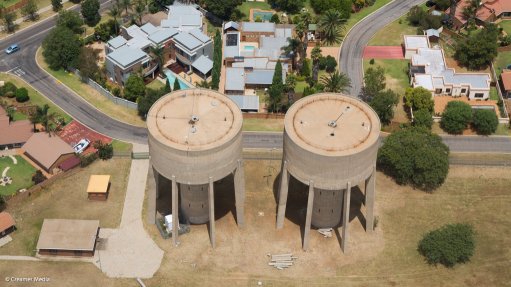Marine anchor handling vessel upgrades DP system
Specialist marine services provider Smit Amandla Marine has completed the R5-million upgrade of anchor handling vessel Smit Lombok.
This involved the installation of a dynamic positioning (DP) system, which takes control of the tug’s hydraulic propulsion units, enabling it to hold position. The instal- lation was performed without disrupting the vessel’s schedule to maintain the level of service it provides to South Africa’s national oil company, PetroSA.
The upgrade entailed the installation of the Kongsberg K-Pos DP11, a single DP system designed to meet the requirements of class notations equivalent to DP Class 1.
“During the installation process, there was a strong adherence to the highest safety, health, environmental and quality standards, which resulted in a safe and secure operation without any accidents,” says Smit Amandla Marine vessel manager Graham Dreyden, who adds that Smit Lombok is contracted to PetroSA for offshore supply and support activities.
Smit Lombok, currently off the coast of Mossel Bay, in the Western Cape, previously used a manually operated joystick-only system.
The Kongsberg K-Pos DP 11 consists of a controller unit (K-Pos DPC-1) and an ope- rator station (K-Pos OS). The controller unit contains a powerful control computer and input and output units to provide an interface for position-reference systems, sensors and various types of propellers, thrusters and rudders.
The operator station contains a high- performance computer running a Windows-based operating system and a high-resolution colour flat-screen, approved for maritime operations, which provides the main graphic display for the presentation of data serving as the user interface.
The Kongsberg K-Pos DP11 has three operational modes: the joystick mode, the mixed joystick and/or auto mode and the auto-heading mode.
“The old joystick navigational system required an officer to use the joystick to hold the vessel in position, while the new DP system uses various sensors to ensure that the vessel automatically holds its required position. These sensors include two ultrasonic anemometers (wind-speed and direction sensors), an MDL Fanbeam 5 laser reference system, a Kongsberg high- performance differential global positioning system position reference system, an additional gyro compass system and a Kongsberg Seatex MRU5 motion reference unit. All these sensors and reference units feed data into the DP processor, which controls the vessel’s hydraulically driven propulsion system,” explains Dreyden.
The DP system is a great improvement, as it reduces the manual input from a user and employs sensors that counteract currents, winds and wave movement and hold the vessel in position with a possible accuracy of 1 m or less, he says.
“A ship does not rely on anchors to maintain its position in deep waters when using a DP system and can, therefore, carry out its main purpose of providing towing assistance with more ease and effectiveness,” Dreyden notes.
The increasing demand for ships to venture into deeper waters and harsher environments to carry out research and rescue missions, as well as the need to consider more envi- ronment-friendly operating methods, has improved dynamic positioning techniques and technology, he points out.
“The DP system collects data from the environment condition sensors and transfers it to the hydraulic propulsion units, such as the bow and stern thrusters, which control the vessel. The DP system has no limit to offshore distance and no depth limitation, unlike the previous system, which was limited by the depth and distance it could travel.
Meanwhile, global knowledge-based group supplier of high-technology systems and solutions Kongsberg Maritime, the developer of the Smit Lombok’s DP control system, emphasises the environment friendliness of the Kongsberg K-Pos DP11.
“The system reduces fuel consumption and, therefore, carbon dioxide emissions by as much as 20%,” highlights Dreyden.
This approach is based on forecasting the vessel’s motion, rather than acting on current sea conditions, using nonlinear model predictive control, which improves the efficiency of the predicted vessel offset against the use of thrusters.
“In doing so, small and short-term disturbances do not force the vessel out of its operational boundary, as they are filtered out, allowing for smooth control, substantially lowered peak loads and significantly reduced wear and tear on a vessel’s hydraulic thrusters, which is part of Kongsberg’s ‘Green Ship Strategy’, states Dreyden.
“The improved steadiness of the vessel has greatly reduced the risk of collisions with oil rigs and offshore drilling platforms when working in close operation with the vessel, ” he adds.
The new system also eliminates human error, owing to fatigue, and there is more control when transferring cargo such as fuel and supplies to other vessels by accu- rately holding its position.
The tug’s engineers also attended an advanced electronic DP maintenance course offered by leading manufacturer and supplier of marine and diving equip- ment company Unique Hydra, the locally approved supplier and service agent of Konsberg systems.
Article Enquiry
Email Article
Save Article
Feedback
To advertise email advertising@creamermedia.co.za or click here
Press Office
Announcements
What's On
Subscribe to improve your user experience...
Option 1 (equivalent of R125 a month):
Receive a weekly copy of Creamer Media's Engineering News & Mining Weekly magazine
(print copy for those in South Africa and e-magazine for those outside of South Africa)
Receive daily email newsletters
Access to full search results
Access archive of magazine back copies
Access to Projects in Progress
Access to ONE Research Report of your choice in PDF format
Option 2 (equivalent of R375 a month):
All benefits from Option 1
PLUS
Access to Creamer Media's Research Channel Africa for ALL Research Reports, in PDF format, on various industrial and mining sectors
including Electricity; Water; Energy Transition; Hydrogen; Roads, Rail and Ports; Coal; Gold; Platinum; Battery Metals; etc.
Already a subscriber?
Forgotten your password?
Receive weekly copy of Creamer Media's Engineering News & Mining Weekly magazine (print copy for those in South Africa and e-magazine for those outside of South Africa)
➕
Recieve daily email newsletters
➕
Access to full search results
➕
Access archive of magazine back copies
➕
Access to Projects in Progress
➕
Access to ONE Research Report of your choice in PDF format
RESEARCH CHANNEL AFRICA
R4500 (equivalent of R375 a month)
SUBSCRIBEAll benefits from Option 1
➕
Access to Creamer Media's Research Channel Africa for ALL Research Reports on various industrial and mining sectors, in PDF format, including on:
Electricity
➕
Water
➕
Energy Transition
➕
Hydrogen
➕
Roads, Rail and Ports
➕
Coal
➕
Gold
➕
Platinum
➕
Battery Metals
➕
etc.
Receive all benefits from Option 1 or Option 2 delivered to numerous people at your company
➕
Multiple User names and Passwords for simultaneous log-ins
➕
Intranet integration access to all in your organisation


















